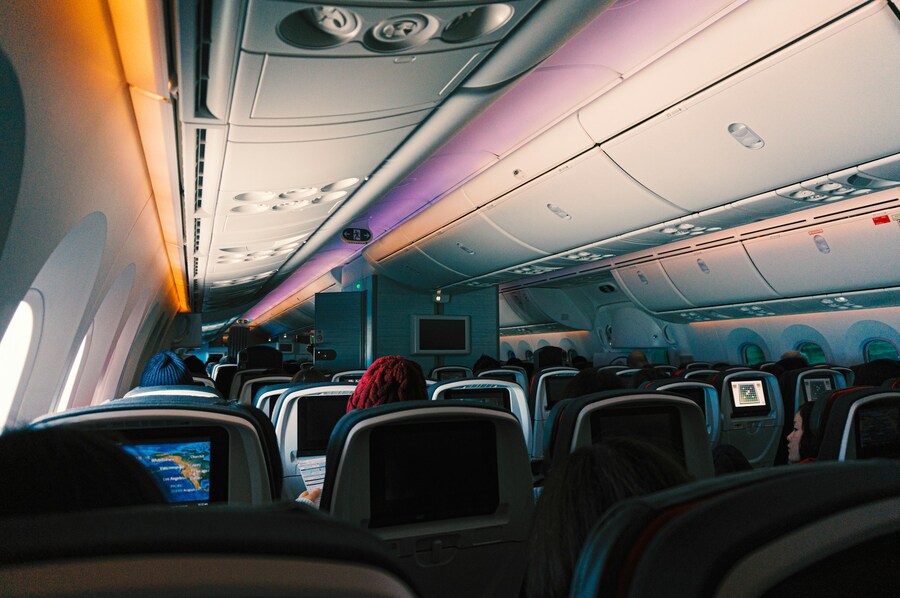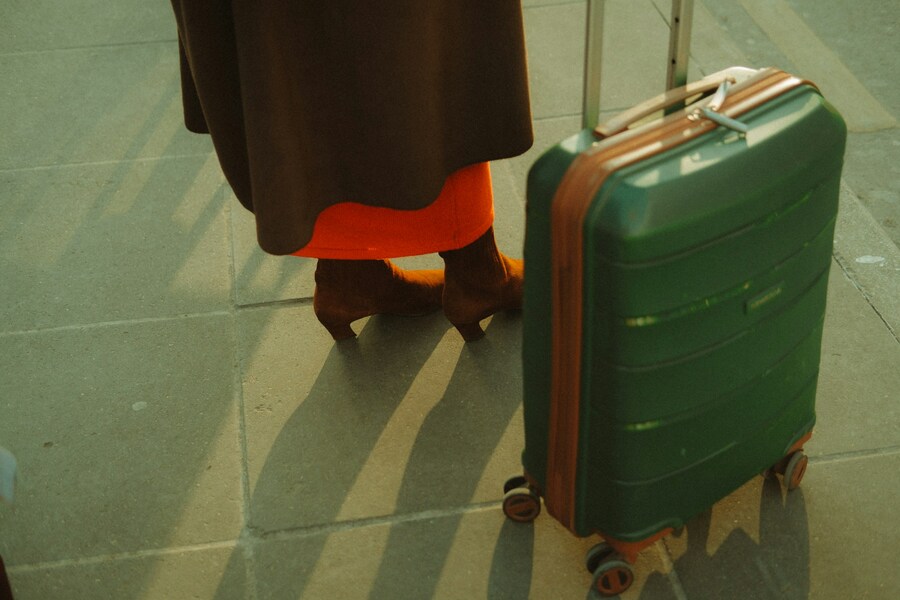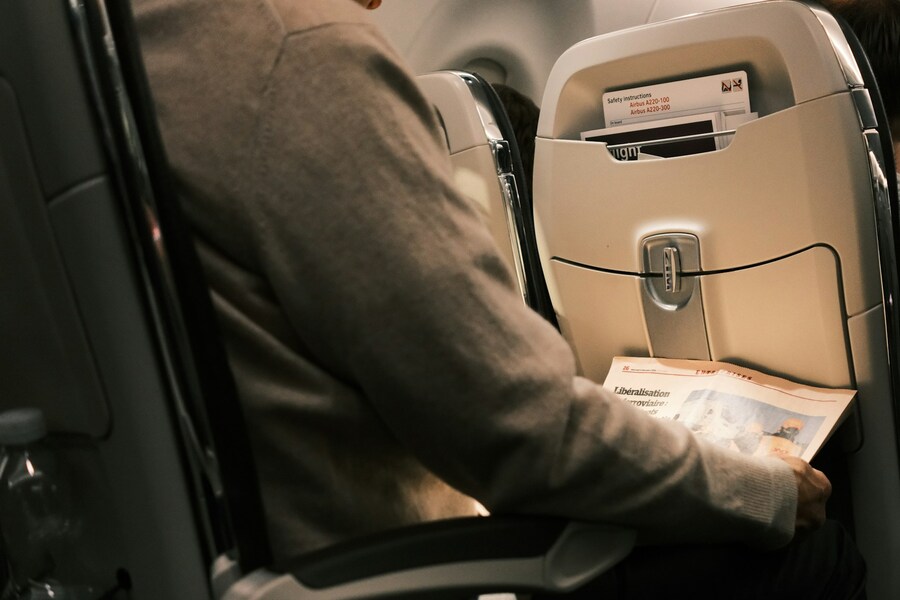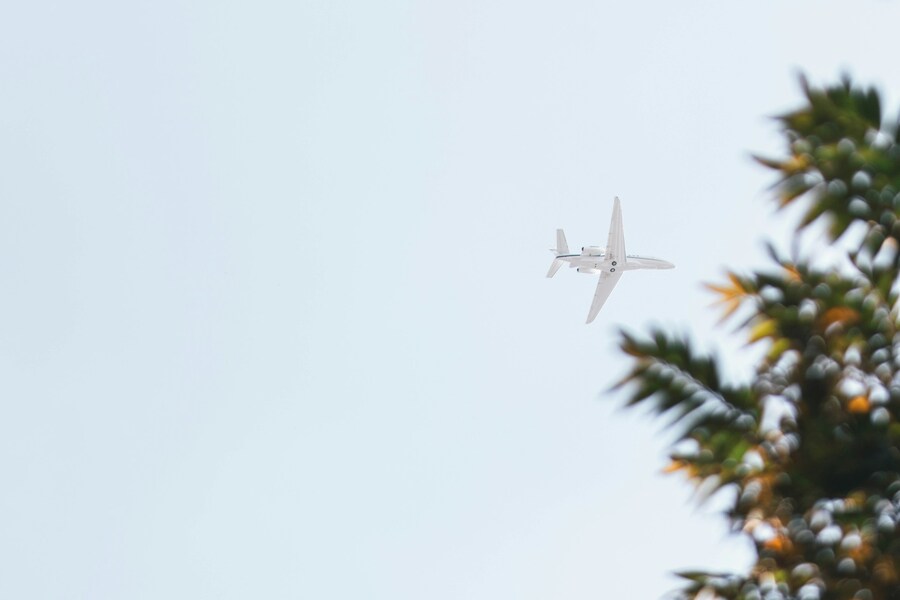The odds of scoring an open seat next to you on a flight are getting slimmer every year. The
So, are you making these common mid-air mistakes?

Source: Takenori Okada/Unsplash
Hold off on claiming your spot until boarding's done
Picture this: you've settled into your window or aisle seat, your bag is stowed, and you notice the middle seat next to you is gloriously empty. You can feel the excitement building as you watch the last few passengers shuffle down the aisle, hoping against hope that no one claims the spot. The temptation to immediately spread out is immense, but the golden rule of air travel etiquette is to wait. Never assume the seat is yours until the cabin door is officially closed. Boarding can be unpredictable. There might be passengers on a standby list who will be assigned that seat at the last minute. Or, a connecting flight could be delayed, and passengers may be sprinting to make their last-minute boarding call. Waiting for the final announcement from the flight attendant isn't just a courtesy; it's a critical part of the process. Rushing to claim the space too early could lead to an awkward conversation and the hassle of moving your things when a new passenger arrives. It's a simple act of patience that pays off, ensuring you don't jump the gun on your newfound personal bubble.
Keep your personal bag up top, not below
Once the boarding process is complete and the middle seat remains empty, your next thought might be where to stash your personal items. While larger carry-ons go in the overhead bin, smaller bags like backpacks, purses, or jackets are meant to be stored under the seat directly in front of you. With the middle seat open, it's tempting to slide your bag under the seat in front of that empty spot to get maximum legroom. However, remember the unwritten rule: the empty middle seat is considered a shared resource. Claiming the under-seat storage area of that empty space without a word is a bit inconsiderate. It's an unwritten rule of air travel that the empty space is for everyone in the row to benefit from. If your rowmate doesn't have a personal item to store, or if they're also an aisle or window seat traveler who is more focused on their own space, then you can consider it a green light to use that under-seat space for your belongings. A simple nod or polite gesture to your fellow passenger is all it takes to confirm.

Source: Alexander Lunyov/Unsplash
Always ask before spreading out
The moment you've been waiting for has arrived: the empty middle seat is officially yours to enjoy. But before you start stretching out, remember that this is a shared victory. The passenger next to you is also aware of this new and exciting personal real estate. The most important thing to do is to communicate. As etiquette expert Patricia Rossi advises, a simple conversation goes a long way. Something like, "Lucky us, we have this beautiful square of sky space to share. Would you mind if I put my iPad and snacks here?" can open the door to a friendly interaction. It's a good idea to put your things on your side of the seat. If you're a window seat passenger, you can use the empty seat's tray table for a drink or a snack, but be mindful not to let it spill over to the other side. This small gesture shows respect and consideration for the person in your row.
Also, it's wise to remember that some airlines, such as United, allow passengers to purchase an extra seat for added comfort. In this case, the empty seat is technically not empty at all but is a paid-for space that belongs to the person next to you. Before you move your belongings into the empty space, take a quick glance around to see if your seatmate is already using it. A coat, a bag, or even a book can be a good indication that the space is already spoken for.
Don't settle in too much
It's easy to get lost in the feeling of having a whole row to yourself, but a word of caution: the empty seat isn't always yours for the entire flight. The in-flight experience is dynamic, and a flight attendant may need to re-accommodate passengers for various reasons. For example, a seat might break, a passenger might have a medical issue and require a new seat, or a family might need to be seated together. The flight crew's job is to ensure the safety and comfort of everyone on board. If they need to move someone into the empty middle seat, it's their right to do so. A good traveler understands that flexibility is key. Your moment of bliss might be short-lived, so don't get so comfortable that it's a major disruption if you have to readjust. This happens, and it's best to be ready for it.

Source: Claudio Schwarz/Unsplash
No assuming your buddy can join
It's a common scenario: you're traveling with friends or family, but you couldn't get seats together. When you find yourself next to an open middle seat, it's a natural instinct to invite your companion to join you. But before you do, think about the person on the other side of that empty seat. They're likely just as thrilled as you are about the extra space. Moving someone in could disrupt their peace and sense of personal space. The courteous thing to do is to ask them for permission first. A simple "My friend is in a seat a few rows back; would you mind if they joined us here?" can make all the difference. Try to do this as early in the flight as possible, so your new seatmate can settle in and be comfortable with the change.
You also need to check with the flight attendants. A flight crew conducts a weight and balance check before departure. An empty seat might have been intentionally left open to ensure proper weight distribution and a safe takeoff. Don't just assume it's free for the taking – ask first. This small act of respect can prevent a big hassle later on.
More unspoken airplane etiquette tips
Beyond the middle seat, there are countless other unspoken rules of air travel. The armrest debate is a perfect example. While it's a topic with no clear consensus, the widely accepted rule is that the person in the middle seat has a claim to both armrests. This is a small compensation for being stuck between two strangers, with no window to gaze out of or easy access to the aisle. The window seat passenger controls the window shade, while the aisle seat passenger gets to get up and stretch their legs without having to climb over anyone. It's a delicate balance of perks and annoyances, and the armrests are the middle seat passenger's small victory.
Another point of contention is reclining your seat. While you technically have the right to recline your seat, it's a good idea to be mindful of the person behind you. You don't want to inadvertently spill a drink or knock over a laptop. Before reclining, glance back, and if you can, give a polite heads-up to the person behind you. They may be eating, working, or simply enjoying their limited space. Respecting this boundary shows a high level of travel maturity.
As you plan your travel, whether for business or pleasure, it's the little things that make the biggest difference. The same goes for ground transportation. For example, finding the right domestic airport parking option can feel like a chore, but it doesn't have to be. Services like ParkingNearAirports.io make it easy to pre-book a spot online and even take advantage of an occasional airport parking promo. You can check out their airport parking rates and reserve your spot in advance, which can save you a lot of time and money, especially if you're traveling during peak seasons. Our smart reservation system provides a range of services, including hotel and shuttle services, to make your trip as smooth as possible.

Source: Jason Jarrach/Unsplash
Conclusion
Ultimately, all these unwritten rules, from sharing the middle seat to being mindful of your fellow passengers, boil down to one simple principle: courtesy. Navigating the modern world of travel requires a heightened awareness of others. Whether you're flying across the country or just a few states away, the shared spaces of airports and airplanes are microcosms of society where small acts of kindness can have a big impact. Your pre-trip planning, like finding affordable airport parking or getting to the gate early, sets the stage for a smooth journey. But once you're in the air, your actions directly affect those around you. Being a good travel citizen means respecting the limited space, communicating openly, and remaining flexible. No one wants to be "that passenger" who is inconsiderate or oblivious. A little kindness goes a long way in making the flight experience better for everyone involved. It's about leaving a positive impression not just on your destination, but on the people you encounter along the way. A little consideration can transform a cramped cabin into a more pleasant and harmonious environment for everyone. These small acts of kindness are what truly elevate the travel experience from a mundane chore into an enjoyable part of your journey. They ensure a peaceful trip for all. Happy travels!






